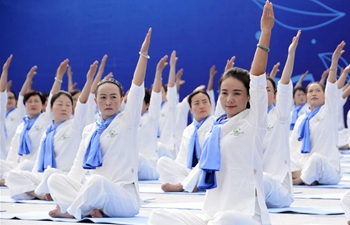SYDNEY, May 17 (Xinhua) -- A vast majority of Australian women do not eat well enough, a study published on Wednesday has found.
The study, compiled by researchers at the University of Melbourne, found that nearly 80 percent of Australian women were not eating enough fruit and vegetables while 70 percent don't do enough exercise.
Researchers obtained data from 20,000 women aged between 19 and 98 years old and found that most were making themselves more vulnerable to heart disease, stroke and dementia.
Cassandra Szoeke, the Director of the Women's Healthy Ageing Project at the University of Melbourne, said that lack of awareness surrounding women's health was alarming.
"The recent Alzheimer's Association report showed that of all cases of dementia, two thirds are women. And last year the Hidden Hearts report showed heart disease was more common in women than men. Yet when asked, women most feared getting breast cancer despite the fact they had twice the lifetime chance of getting dementia - a terminal disease," Szoeke, who authored the study, told a university publication on Wednesday.
She said that the chances of contracting heart diseases and dementia could be reduced by limiting alcohol consumption, quitting smoking, exercising and consuming five servings of fruit and vegetables a day.
An English-lead study published in respected journal The Lancet in August 2014 found that addressing risk factors could halve the cases of dementia worldwide but Szoeke said those health targets were still not being achieved.
Researchers found that women aged over 45 with two risk factors had a 30 percent chance of developing heart disease by the time they were 80 years old while those with zero risk factors had just a four percent chance of developing the disease.
"There appears to be a focus on the fact women live a few more years than men. But research has shown us that 90 percent of the gains in life expectancy for women is spent with a disability. Women are more likely to have a chronic illness, multiple disabilities and have higher health service use." Szoeke said.

















